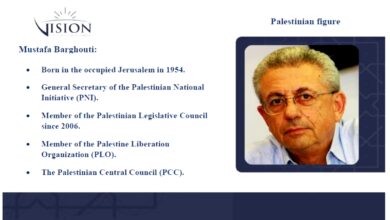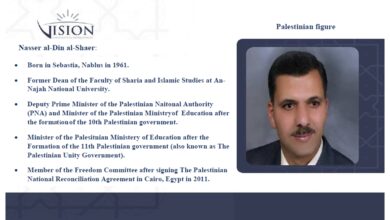Khalida Jarrar
Khalida Jarrar
KhalidaKan’anRatrout Jarrar was born in February 1963 in Nablus, in the North of the West
Bank for a family from the city Beisan in 1948. She is married and has two daughters. Jarrar
studied her elementary stage at Qurtuba School, preparatory school in Alkarmel School, and the
high school in the Al’ashyyah School. She earned her high school certificate in the scientific
stream in 1981. She earned her Bachelor degree in Business Administration at Birzeit University
in 1985, MA degree in Democracy and Human Rights in 2003. Jarrar worked directly after her
graduation as a researcher for three months in a studies center. She then became administrative
and financial officer in a project between Birzeit University and Norway that focused on helping
women in their own projects. Khalida Jarrar continued working in her project until 1988. She
also worked with the United Nations Relief and Works Agency for Palestine Refugees in the
Near East (UNRWA) in boosting the role of the Palestinian woman. Jarrar then joined
ADDAMEER (Arabic for conscience) Prisoners Support and Human Rights Association. She
took over the management of the Association from 1990- 2005.
Jarrar has been influenced by the national status since her early youth. She joined the
volunteering committees and participated in the protests and demonstrations against the
occupation. She was captivated by the thought of the left-wing notion. Therefore, she joined the
students’ movement during her study in the university. Jarrar joined the Popular Front for the
Liberation of Palestine. She met her husband Ghassan Jarrar and shared with him his political
activism. Jarrar interacted with the First Palestinian Intifada. She made gradual progress in the
Front as a political feminist. The occupation arrested her for the first time in 1989 for a month. It
prohibited her from travelling since 1998. The occupation also decided to deport her to the City
of Jericho in 2014, but she rejected the decision. Therefore, they arrested her in 2015, and she
was sentenced for 15 months. They arrested her again as an administrative arrest in 2017 for a
period of 20 months.
Jarrar won the membership of the Palestinian Legislative Council in the elections of 2006 of the
list of the martyr Abu Ali Mustafa. Winning the elections contributed to get her membership in
the Palestinian Central and National Council. Jarrar chaired the Prisoners, Martyrs, and wounded
committee in the Palestinian Legislative Council. She also contributed to the dialogues of the
reconciliation and its committees. Then, she occupied the membership of the elections
committees resulted from the reconciliation committees, which are issued after the reconciliation
agreement in Cairo 2009, as well as her previous membership in the executive committee in the
Palestinian Liberation Organization (PLO).
Jarrar published multiple pieces of research that tackled the Palestinian female prisoners in the
Israeli occupation prisons. She wrote a book about the Feminist Captive Movement, in which she
won the award of freedom from the Commission of the Detainees Affairs in 2016.
Jarrar believes that the future of the Palestinian Cause is burdensome, as there is a serious danger
that requires a Palestinian strategy, the first steps of which is ending the Palestinian division,
focusing on the endurance and resistance through establishing public coalitions on the national,
regional and international levels. She also believes that Oslo Accords was a mistake that it’s
necessary to overcome. Moreover, Jarrar constantly gives the PLO emphasis on breaking the
agreement and stopping all of its forms with the occupation, especially under the circumstances
of the failure of the negotiations.
She believes that the standards of the International Law and the International Humanitarian Law
prescribed the Palestinians’ right to resist the occupation, and resistance may use tools based on
the reality and its necessities. The war on Gaza in 2014 emphasized that resistance is the best
choice. Jarrar believes in the necessity of ending the division regardless of who caused it,
working on fulfilling the political partnership based on a political study that doesn’t tackle
negotiations and political compromising, adopting the requirements and the approach of the
resistance, reestablishing the PLO on the foundations of democracy as an implementation of the
agreement in Cairo, conducting elections for the National Council in the participation of all
Palestinian parties based on the proportional representation.



